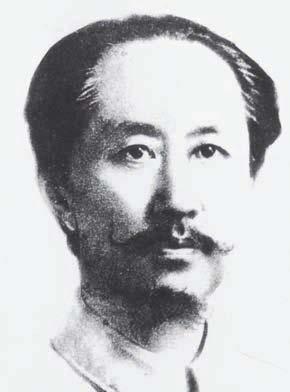September 30: Li Shizeng, founder of the Palace Museum, dies
On September 30, 1973 (the fifth day of the ninth lunar month), Li Shizeng, the founder of the Palace Museum, died.

Li Shizeng (May 29, 1881 (136 years ago) – September 30, 1973), also known as Li Yuying, pen name Shi Monk and Zhenmin, was a Native of Gaoyang County, Hebei Province, a Chinese social educator and one of the founders of the Palace Museum.
Li Shi was born into a family of Qing dynasty officials, and his father, Li Hongzao, was the second prince of Tongzhi and Guangxu. Since childhood, he studied Sinology with Qi Yuting.
In 1902, he accompanied Sun Baoqi, the Qing ambassador to France, on an envoy to France. Li Shi studied agriculture in France for 3 years, and then entered the Pasteur Institute and the Faculty of Science of the University of Paris to study the philosophy of biological evolution. And with the scientific method of studying the function of soybeans, he published the special book "Soybean" in French, and he was the first Chinese to publish academic papers in France.
In 1906, Li Yuying, Wu Jingheng, Zhang Jingjiang and others initiated the organization of the World Society in Paris. In August 1906, Li Shi joined the League.
In early 1920, Li Shi, together with Cai Yuanpei and Wu Jingheng, used Gengzi's indemnity to establish the Sino-French University in Beijing. Li Shi served as chairman and Cai Yuanpei served as president. In the winter of 1920, Cai Yuanpei and Li Shi arrived in France and negotiated with herriot, the mayor of Lyon, France, to establish the Association of Sino-French Universities in Lyon and the establishment of the Sino-French University of Lyon. The Sino-French University of Lyon was suspended until 1947 due to financial difficulties.
In 1923, Cai Yuanpei resigned as president of the Sino-French University in Beijing, and Li Shi immediately served as acting president. After the "March 18 Massacre" in 1926, Duan Qirui, the provisional ruler of Beijing, ordered the arrest of Li Dazhao, Li Shizeng, and others on the charge of: "Under the pretext of the Communist Party, the masses gathered, led the rioters, and attacked the State Council." Li Shi once avoided living in the French Hospital in Dongjiaomin Lane. The president of Sino-French University was succeeded by Li Shuhua.
In January 1924, the first national congress of the Chinese Kuomintang was held in Guangzhou, and Li Shi was elected as a member of the Central Control Commission, and then re-elected as a member of the Second to Sixth Central Supervisory Commission and the Seventh to Tenth Central Committee Review Committee.
In October 1924, Feng Yuxiang launched the "Beijing Coup", and on November 5, the Qing Emperor Puyi was cancelled and expelled from the Forbidden City. Li Shi immediately proposed the establishment of a Qing Chamber Antiquities Preservation Committee and a Qing Palace Aftermath Committee. Both committees were chaired by Li Shi. Hua Shikui was extremely dissatisfied with Li Shi, and saw people scolding Li as a "wenzheng evil son". In September 1925, the "Qing Palace Aftermath Committee" formulated the "Provisional Organizational Outline of the Palace Museum" and the "Articles of Association of the Provisional Board of Directors of the Palace Museum". On October 10, 1925, the National Palace Museum was officially established. Thus preserving the precious cultural relics of the Forbidden City to this day.
In April 1927, the 74th session of the Central Political Conference of the Nationalist Government was held in Nanjing, and Li Shi proposed the establishment of the Academia Sinica, and the meeting resolved to elect Li Shizeng, Cai Yuanpei, Zhang Jingjiang and others to jointly draft the Organic Law of the Academia Sinica. On May 9 of the same year, the 90th session of the Central Political Conference decided to establish the Preparatory Department of the Academia Sinica, and presumed Cai Yuanpei, Li Shizeng, Zhang Jingjiang and others as preparatory members of the Academia Sinica.
In June 1927, the Northern Expedition was successful and Beijing was renamed Beiping. The Nationalist government appointed Li Shi as president of National Peking University, president of normal university, and president of the National Peking Research Institute; in 1973, Li died of illness in Taipei.
Source: Zhongnanhai Art Museum Editor-in-Charge Xiao Chang